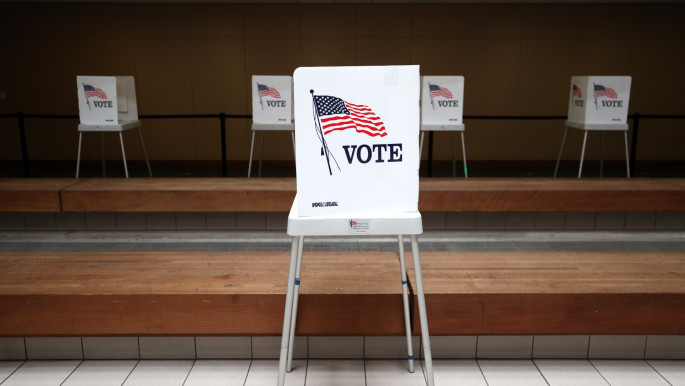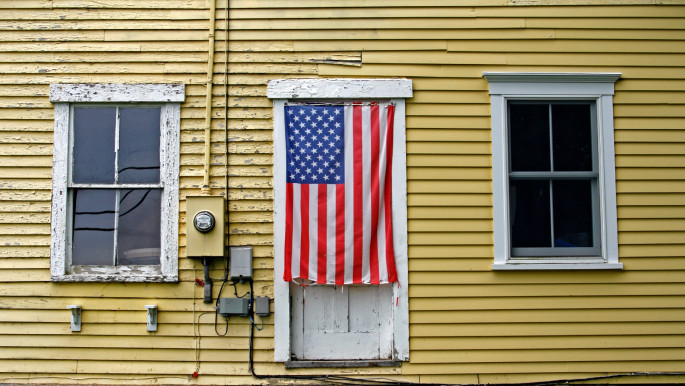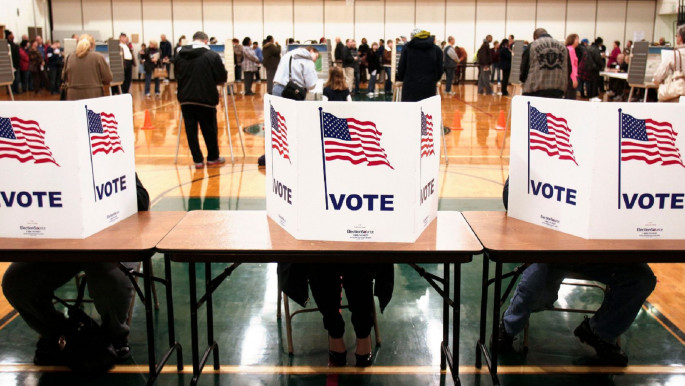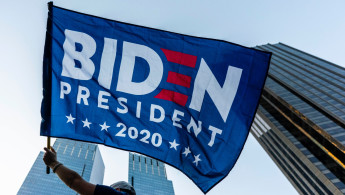How Arabs and Muslims helped flip Michigan blue for Biden
Michigan, part of what was considered the Democrats' reliable blue wall of the industrial upper Midwest, became an important symbol of Hillary Clinton's loss in her 2016 presidential bid, prompting soul searching within the party about how it had lost the white working-class vote.
But the state is also home to the country's largest concentrations of Arabs and Muslims, who would four years later help flip Michigan back to the Democrats by an even wider margin than Donald Trump's 2016 win.
"There's no doubt that the Arab American community showed up for Biden. We delivered," says Sirene Abou-Chakra, a volunteer for Arab Americans for Biden, who works as chief development officer for the city of Detroit. "I feel like this is the first time I've been able to exhale in four years."
In Dearborn, dubbed the Arab capital of North America, around 70 percent of votes went to Biden. In Wayne County (home to Dearborn) and Oakland County, around 80,000 and 104,000 more people respectively voted in 2020 than in 2016.
 |
There's no doubt that the Arab American community showed up for Biden. We delivered |  |
Overall in the state, more residents cast their ballots in the 2020 presidential race than in any previous Michigan election, according to the Michigan Secretary of State's website.
This was a major shift, not just for voters in Michigan, but across the country compared with 2016. Overall, around 160 million Americans voted in this election, up from around 138 million four years ago.
"Arabs staying home in the general election cost Hillary (Clinton) Michigan," says M. Baqir Mohie El-Deen, a community activist from Dearborn, pointing to increased voter turnout in 2020 compared with 2016 in the Arab and Muslim communities, reflecting an overall nationwide trend.
 |
|
| Read more: The Arab and Muslim candidates fighting to transform American politics |
Clinton's campaign in Michigan came at a difficult time for Arabs and Muslims, many of whom were disappointed at the primary loss of the communities' and the state's favoured candidate Bernie Sanders, the Vermont senator who had, unlike many politicians, shown sympathy for the Palestinians, in addition to championing progressive causes that had long been considered too radical for much of the democratic party.
But the 2016 presidential election, with its devastating implications for these communities, sparked an unprecedented sense of determination to make an impact in the next one.
"When the Muslim ban happened, I was at work. We had to quickly organise a protest," recalls Nada Al-Hanooti, a Palestinian American who serves as executive director of Emgage Michigan.
2018 – An important turning point
The work appeared to start paying off in the 2018 midterm election with the win of Rashida Tlaib to Congress, as well as the strong support the same year for the gubernatorial bid of Abdul El-Sayed, who lost but who helped engage these communities.
The 2018 midterm elections were the first indication that the outreach was working, and a sign that they had the chance to flip Michigan to the Democratic Party in the 2020 presidential election.
 |
In Dearborn, dubbed the Arab capital of North America, around 70 percent of votes went to Biden |  |
"2018 was the year for Muslims in Michigan. It gave us a lot of hope, even with Trump's bigoted policies," says Al-Hanooti, whose work with Emgage helped reach out to 360,000 Michigan voters by phone and 1.4 million by text message.
"Emgage really invested a lot in Michigan," says the civic organization's CEO Wa'el Alzayat. "We made investment in access, voter data, and filtering it for different demographics. It was a multi-million-dollar operation. The Muslim community hasn't had access to this data before. It's hundreds of thousands of dollars to have this access, and we need trained people who understand data."
He says the results so far are promising, noting, "We focused on counties where we knew there were large numbers of registered Muslims. The early data out of Michigan so far shows that at least 81,000 Muslims voted early or via mail. That's four times as big as 2016. In Michigan specifically, we think we're on pace to have historic numbers of Muslim Americans who voted."
He adds: "We knew the community had the ability to be the deciding factor in the election." Alzayat is quick to point out that their work is far from over, as it is important to keep the community engaged and voting consistently. Moreover, he emphasises that all minority communities played an important part in this pivotal election.
 |
|
| Read more: Navigating Arab identity in America's racial landscape |
"Black and Hispanic communities played a huge role. They all deserve credit," says Alzayat. "We can't do this on our own."
"There was a lot of justice in this election. Flipping Michigan with the Muslim ban, Arizona with John McCain and Hispanic voters. Georgia with black voters. All of these states have been taunted by this bully. And they punished back," says Abou-Chakra.
A new strategy
In March, right after Biden became the nominee, Fayrouz Saad co-founded Arab Americans for Biden with one goal in mind: vote out Trump.
"The mission was simple. Get rid of Trump. Elect Biden. Empower the Arab community in the process," recalls Saad. Though she faced initial resistance, she was able to get people on board through her diligent and patient outreach.
"There was some reluctance. A big portion of the community is more progressive. But a lot of people were willing to listen and to have an open mind," she says. "With all of us working together, we were able to establish relationships and say, 'Let's give the campaign a chance and tell them we're concerned about these things.'"
 |
The mission was simple. Get rid of Trump. Elect Biden. Empower the Arab community in the process |  |
"I feel like this was the closest I've ever felt to a candidate. I felt heard as an Arab American," says Abou-Chakra, who joined Arab Americans for Biden over the summer.
Once they gained momentum, they were ready for 2020. Though Sanders, the preferred candidate for both communities in Michigan, did not win the party's nomination, the Biden team was able to tap into lessons from Clinton's campaign from four years earlier by showing the communities that they would have a candidate who listened, who worked to earn their support, and who would not take their votes as a given.
"The campaign didn't take Arab and Muslim votes for granted. The campaign had deep and thoughtful conversations on issues. Folks felt like they were being heard. It didn't feel like the campaign just showed up. The communities are getting sick and tired of that," Saad says.
 |
|
| Explainer: Why is the Arab American vote so important in the 2020 US election? |
For her, this campaign was different. "Of all the presidential campaigns I've been a part of, I've never seen a nominee engage the Arab-American community in such a diverse and unique and meaningful way. There have been a lot of flyovers, but nothing substantive or deep."
Referring to the Biden campaign's policy promises to Arabs and Muslims (such as pledging to repeal the Muslim ban), included on the campaign website, as well as his (remote video) speaking engagement at the Million Muslim Votes Summit, in which he quoted the Quran, she says, "It was not just talk. He earned our votes. It should be the standard. No one's vote should be taken for granted. I think what's wonderful is the precedent this sets."
This was a real difference and a welcome change from past elections, when not only did campaigns ignore these communities, but actively sought to distance themselves from what they saw as bad publicity.
According to an October report by pollster James Zogby, president of the Arab American Institute, discrimination against Arab support has been a long-time policy of both parties.
He noted, "In 1984, Walter Mondale running for President returned money to Arab American donors and in 1988, Michael Dukakis' presidential campaign rejected an Arab American endorsement. In the years that followed, a Republican Congressman running for Senate asked Arab American leaders not to contribute to his campaign as did a Democrat running for Mayor in New York City."
Similarly, Muslim political support has been consistently met with apprehension over the years. During Barack Obama's campaigns and time as president, he and his office were careful to distance themselves from Muslim supporters. At a 2008 rally, attendees wearing hijabs said they were told to step away from the podium so as not to appear on television with Obama.
"That unfortunately has happened in the past. This campaign not only recognised that's no way to treat voters, but that's not how the campaign operated. They respected voters," says Saad.
This time, the strategy could not have been more different. Community activists say that the Biden campaign has genuinely engaged with them from the very start of his nomination, offering resources and listening to their concerns. It has been a consistent effort on all sides, with the campaign engaging in meaningful outreach, while the communities make sure they're heard – and once he takes office, held accountable.
"He said he'll repeal the Muslim ban on day one," Al-Hanooti says. "Michigan Muslims brought it home for Biden, and we expect him to show up for us in January."
Brooke Anderson is a freelance journalist covering international politics, business and culture
Follow her on Twitter: @Brookethenews


![President Pezeshkian has denounced Israel's attacks on Lebanon [Getty]](/sites/default/files/styles/image_684x385/public/2173482924.jpeg?h=a5f2f23a&itok=q3evVtko)



 Follow the Middle East's top stories in English at The New Arab on Google News
Follow the Middle East's top stories in English at The New Arab on Google News


